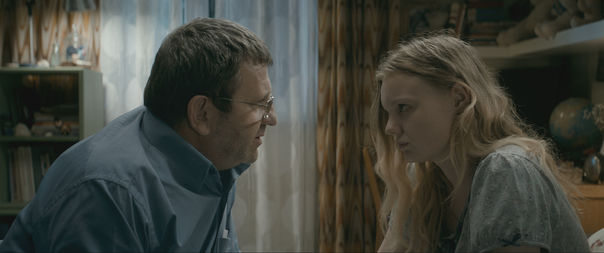Graduation: Eastern-European Cheating Games
written by Petra Meterc

Graduation
When, last month, Melania Trump delivered a speech plagiarised from Michelle Obama, Associate Professor of Political Science at the University of Chicago dr Monika Nalepa wrote a blog for the Washington Post Online Edition, where she claims the cheating to be endemic of Eastern-European culture. While the article is quite generalizing and presumptuous, the film Graduation (Mungiu, 2016), a narrative on cheating seen from a Romanian and therefore Eastern-European perspective, could partially comply with dr Nalepa’s claims.
Christian Mungiu, one of the Romanian new-wave front-runners is telling us a story of a father (Adrian Titieni) who would do anything for the success of his daughter (Maria-Victoria Dragus). The father figures his daughter won't be able to pass her high-school finals as successfully as planned due to the assault she felt victim to the previous day, so he decides to take things into his own hands. He uses his social network for the favour he needs, and Mungiu's Romania seems the right country to do so. Even though the central character seems to be caught in a chain-reaction of moral decision-making to which there seems to be no ending, it is the highly corruptive and rigid bureaucratic system that Mungiu dissects, not the character. This system functions as a clientelistic jungle; the culture of favours works on all levels, be it law, the health service or the educational system, filling the gaps caused by the state's shortcomings. “Don't tell me you live off your pay check,” the father is told at some point, yet funnily so, he is renowned as one of the doctors who actually don't accept bribery.
Yet it seems this doesn't help him much in life. The film jumps from the public to the private sphere and both are presented as similarly dysfunctional. Disillusioned by the post-soviet transitional society, he seems to be entrapped in constant failure. The mysterious stone throwing that he perceives as some kind of bad omens only intensifies this mood. He fails most in his relationships. Not only is his wife (Lia Bugnar) depressed, his lover (Malina Manovici) is disappointed by him (when she is introduced we also find out that he is ironically named Romeo), and his daughter is annoyed by her father's personal frustration transforming her into his child-project. He is completely detached from all of these women and yet still only obsesses about whether or not his daughter is going to a prestigious British university and thus succeeding in his glorified concept of the West. The lesson comes in a non-climatic way at the end and actually has more to do with the generational differences than with corruption, which is great food for thought.
Yet for someone familiar with Mungiu's cinematic language as well as with other films tackling the topic of corruption in Romania, such as Corneliu Porumboiu's Police, Adjective (2009), Graduation does not live up to expectations. It seems as though Mungiu made a step aside from the typical, almost dogmatic aesthetics and the rough realism is toned down. The film presents the viewer with an overwhelming abundance of action and issues addressed, so the focus of the main storyline sometimes gets lost. The pace of the film is often sped-up due to several plot lines of which some feel redundant, such as the story of the lover's son and the scenes with the daughter's boyfriend. Also, the omnipresent corruption being demonstrated by such an amount of examples can work against the film's realism. Topic-wise, a parallel could be drawn with the Bulgarian The Lesson (Grozeva and Valchanov, 2014) in which the Dardennian thriller-like critique of the dysfunctional society is built around the metaphor of a school theft. Graduation, maybe not surprisingly co-produced by the Dardenne brothers, lacks at least a tiny step out of the plot's comfort-zone.

